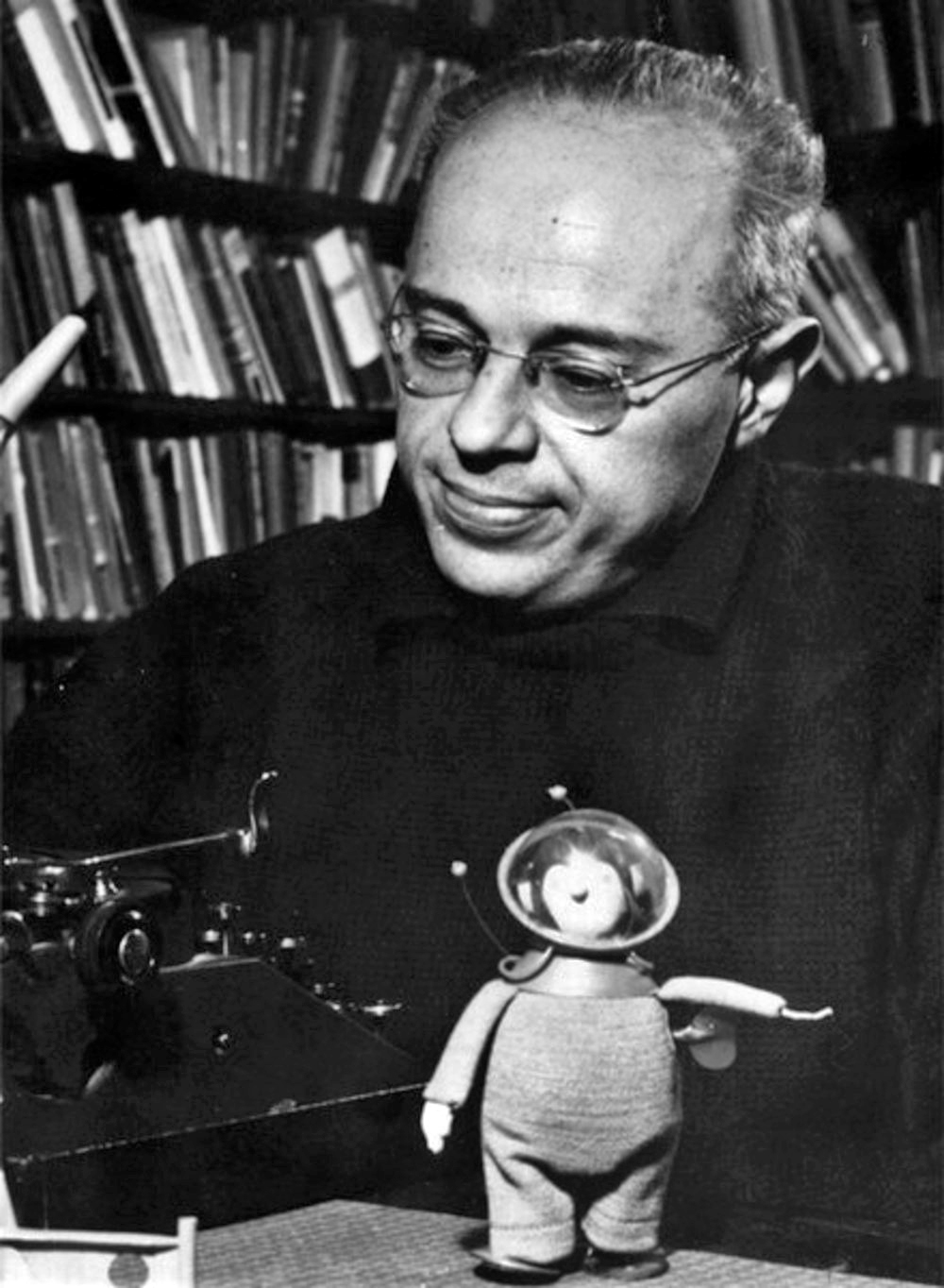
Stanisław Herman LemSta
Category : monumentDocs , NameGivingDocs , WriterDocs

Stanisław Herman Lem (also known as Stanislaw Lem, pronunciation: [staˈɲiswaf lɛm]; September 12, 1921 in Lwów, Poland – March 27, 2006 in Kraków) was a Polish writer, best known as a science fiction author, philosopher, and essayist. Lem’s works have been translated into 57 languages and sold more than 45 million copies. He is one of the most widely read science fiction authors, although he did not like to call himself that because of the complexity of his work. Due to the numerous puns and neologisms, his works are considered difficult to translate.
Lem is considered a brilliant visionary and utopian who conceived numerous complex technologies decades before their actual development. As early as the 1960s and 1970s, he wrote on topics such as nanotechnology, neural networks, and virtual reality. A recurring theme is the philosophical and ethical aspects and problems of technological developments, such as artificial intelligence, human-like robots, and genetic engineering. In many of his works, he employed satire and humor, often subtly exposing the hubris of the belief in human superiority based on faith in technology and science. Some of his works also contain gloomy and pessimistic aspects regarding the long-term survival of humanity. He frequently addressed attempts by humans to communicate with extraterrestrial intelligences, which he addressed as a major failure in one of his best-known novels, Solaris.
In the 2000s, the multifaceted Lem became a critic of the internet and the information society—something he had predicted, in part—because they turned users into “information nomads” who merely “hop incoherently from stimulus to stimulus.” “It is proving increasingly difficult to bring together different sources and perspectives to obtain a well-rounded, complete picture of a subject.”
Stanisław Lem was born into a Polish-Jewish family of doctors. His father, Samuel Lem, was an ENT doctor; the satirist Marian Hemar was his cousin.[2]
Lem had a sheltered childhood. He studied medicine at the University of Lviv from 1940 until the German occupation of Lviv in 1941. His studies were interrupted by World War II. Lem was able to conceal his Jewish origins with forged papers; most of his family perished in the Holocaust.
“It took Hitler to help me realize I was Jewish.”
During the war, he worked as an assistant mechanic and welder for a German company that recycled scrap metal. He helped the resistance against Nazism. When Poland was liberated from the Nazis by the Red Army towards the end of the war and the country came under the Soviet Union’s sphere of influence, he continued his studies in Lviv. In 1945, after his hometown fell to the Soviet Union, he was forced to move to Kraków.
He resumed his medical studies for the third time at the Jagiellonian University in Kraków. Between 1948 and 1950, he worked at the Konservatorium Naukoznawcze as a research assistant to Mieczysław Choynowski on problems of applied psychology. At the same time, he met the editor of the Tygodnik Powszechny, Jerzy Turowicz, who, along with Choynowski, became a formative figure. Wisława Szymborska was also among his friends at the time. His first literary attempts also occurred during this period, and he began writing stories in his free time, including the plays Yacht “Paradise” (with his friend Roman Husarski) and Korzenie. Drrama wieloaktowe, an anti-Stalinist satire, which was only rediscovered after Lem’s death and published in 2009. In 1948, he wrote his first novel, Szpital Przemienienia (The Wanderings of Dr. Stefan T.), which could not be published until eight years later due to censorship.[4] It was also during this time that he met his future wife, Barbara Leśniak, a radiologist, whom he married in 1953.[5]
Lem received a certificate confirming that he had fully completed his studies. However, in his final exam, he refused to give answers in the spirit of Lysenkoism, because he rejected it. This refusal allowed him to avoid a career as a military doctor, as the examiners failed him for it.
Since he was also unable to practice medicine, he worked in research and increasingly focused on writing.
Lem was a polyglot: he mastered Polish, Latin (from medical school), German, French, English, Russian, and Ukrainian.[6] Lem claimed that his IQ was tested at 180 in school.[7]
In 2013, the Polish research satellite Lem, named after him, was launched into Earth orbit by a Russian-Ukrainian Dnepr launch vehicle as part of the international BRITE project. In German-speaking countries, the Stanisław Lem Way in Halle-Neustadt is dedicated to him.
The Polish Sejm declared 2021 the Year of Stanisław Lem.[23] The dedication is divided between Lem, Stefan Wyszyński, Cyprian Norwid, Krzysztof Kamil Baczyński, Tadeusz Różewicz, and the Constitution of May 3. The first Lem video game, The Invincible, was released in the same year.[24]
The Komet Lem Festival took place in Darmstadt from October 2016 to March 2017.[25] The festival, organized by the Philosophical Institute of the Technical University of Darmstadt, the German Polish Institute, and the State Theater, was dedicated to Stanisław Lem with various events such as readings, plays, and film screenings, as well as musical interpretations of Lem’s works. The exhibition Lem’s Animal Life after Mróz consisted of drawings by illustrator Daniel Mróz based on Lem’s worlds.[26]
J. Doyne Farmer called Lem the “Poet Laureate of Artificial Life” for his achievements.